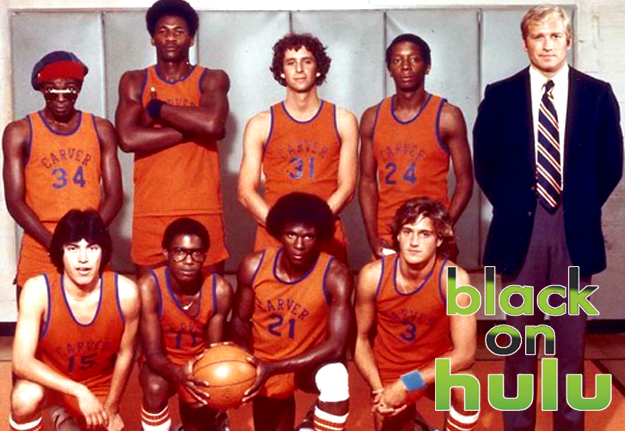by Curtis Caesar John
When perusing Hulu Plus a month ago I came upon a big surprise that I’ve been clamoring for years to see again.
The White Shadow ran on the CBS Television network from 1978 to 1981. Created by huge basketball fan Bruce Paltrow, who would go on to be an executive producer on the hit medical drama St. Elsewhere (where Denzel Washington got his start…more on that show in the near future) the show starred Ken Howard (1776, Crossing Jordan) as Ken Reeves, a newly retired Chicago Bulls player recruited by his college teammate, a current high school principal, to coach a predominantly Black inner-city Carver High School. One can imagine that culture and class clashes are then plentiful. You would be partially right, but mostly wrong.
The fact that this show is a personal favorite comes to the surprise of many of my peers. There is the known-stereotype of the ‘white hero’ who comes to take these ghetto children (yes, the White players are technically ghetto too, even though the connotation is used to amiably describe Blacks/African-Americans) out of laziness and obscurity and get them to apply themselves to a standard that will make them not only a better basketball team, but better men. That promotes an ideal that these boys/men, or another Black man, like their principal Jim Willis, could not be that system.
Yet, I do not take The White Shadow to fall within that trope. Coach Reeves was pretty upfront about his tenacity to make the team succeed, and it was the personalities of his players that made him feel like he could do so, though not instantly. This does not mean that zero white historically paternalistic values existed, but from re-watching multiple episodes the writers seemed to both recognize and cork these from being overbearing to focus on the more fallible qualities of Reeves as he also strove to be a better man to himself, and to instill that in his team. The core of most existing paternalistic attitudes fell in their age differences, and those feelings were constantly reexamined.
A telling episode (SPOILER WARNING) is Season 2, Episode 22 – “The Death of Me Yet?” Coach Reeves and the team finally get the respect they deserve by getting to the city championship game. However, any joy they feel is quickly beset when Curtis Jackson (actor Erik Kilpatrick), the sunglasses wearing cool cat of the team, is murdered when stuck in a liquor store as it is being robbed. Before the tragedy occurs Reeves is being recruited by other schools to come enhance their program they way he did with the once unprofessional Carver team. Sick of the bureaucracy at Carver and compelled by the money (this was the 1970’s where many ex-NBA players could barely rub two pennies together) he checks out a local college with all the bells and whistles any coach would dream of. And the tragedy makes staying at Carver even more questionable. But a chat with Jackson’s little brother makes Reeves see that the future of the community is at stake if the people who helped make it proud just up and leave. The players also ensure Jackson’s legacy by playing the game, just as he would have wanted, and winning the city championship.
Even more telling however is the legacy of the show’s actors, with two standouts becoming powerful producers and directors in Hollywood.
Kevin Hooks, son of stage and screen star Robert Hooks and impressive actor in his own right made his big screen debut as the lead in Sounder (1972) alongside Cicely Tyson and Paul Winfield. After playing wisecracking Morris Thorpe on The White Shadow he continued acting in numerous movies and television shows and movies, but then quickly started making his mark as a TV director on shows like St. Elsewhere, V (the TV series – 1985), and continuing today on shows like The Good Wife and Agents of S.H.I.E.L.D. But more notably he began producing and directing feature films and developing television shows. Directing the 1991 comedy Strictly Business led to his helming the Wesley Snipes starring Passenger 57 (1992) and numerous other feature films and TV movies. But his bigger credits lie in his being the Executive Producer of the shows like the inner-city medical drama City of Angels (2000), the FOX series Prison Break, and most recently the Andre Braugher starring Last Resort.

Thomas Carter has a similar trajectory. His directing career actually began on The White Shadow while he was still playing star baller James Heyward, and continued on Fame, Hill Street Blues, and numerous other shows. He quickly moved to producing as well, becoming an Executive Producer on dramas such as Equal Justice (1990-91) and the TV movies like Don King: Only in America (1997). And he also began directing feature films too, most notably the breakout hit Save the Last Dance (2001) and Coach Carter (2005). I should note that Timothy Van Patten, who played “Salami” on Shadow, is also a highly-regarded director, particularly on HBO shows like The Sopranos, Boardwalk Empire, and Game of Thrones.

Check out all three seasons of The White Shadow on Hulu Plus. There are a handful of episodes missing from early in season two, but otherwise you can view it from beginning to end and also see numerous film and televisions guest stars you know and love. And try not to laugh too hard at the short shorts.



